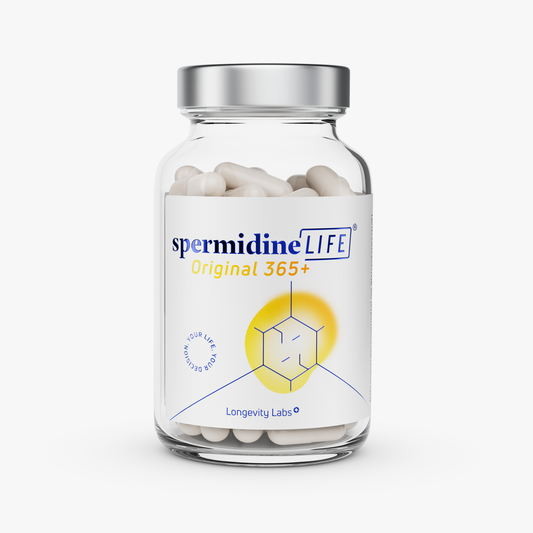
Detox for the head
Memory, TLL LongevityLabsOur stimulus-flooded everyday life full of deadlines, pressure and to-dos quickly leads to exhaustion, concentration problems and constant stress that you just can't seem to get rid of. If you sometimes wish you had some time off, but don't know how to handle the pressure and daily demands without pausing your entire life, here are a few ways to give your mind a break from the chaos of everyday life!
The brain is an organ that responds to stimuli around the clock. Everything we perceive is precisely absorbed, processed and processed for us in a form that makes life possible. Approximately 100 billion nerve cells are constantly working at full speed in our head in such an effective way that we don't even notice it. The good thing is that our brain not only works on all incoming stimuli automatically, but also makes adjustments extremely quickly. The faster the stimulus input, the faster the brain processes and gets used to the speed of everyday life.
The only problem with this is that the brain is not a tireless organ either. We live in a world where we are incessantly flooded with stimuli: Videos, photos, smells, sounds, news, deadlines, stress - our everyday companion. At some point, you feel your concentration waning, you get a headache, and your body, at least in part, is obviously calling for a break. But why then do we often find it so difficult to "switch off" our heads? This is where it gets complicated - because even when we theoretically know we're overworked or exhausted, the brain still wants to keep going because it's used to the speed: If you turn off your laptop, you immediately reach for your cell phone. While you're washing dishes, your favorite show or music is playing in the background, while you're sitting in a meeting, you're processing emails, and when you want to sleep at night, your head just won't stop working and instead floods you with to-dos, worries, wishes, and more. Eventually, you suddenly find yourself in a cycle of stress and thoughts that you just can't keep up with, no matter how "productive" you are.
That's why it's so important to remember to take a step back periodically and give yourself some time off. Our neurons don't know how to slow down on their own, and in a daily routine of family life, work, university, free time, smartphones, social media, etc., it's hard to clear your head. We have a few tips for you on how to give your brain a break and get some distance from the ever-present sensory overload:
Meditation
Meditation is one of the most difficult and at the same time one of the easiest methods to help your body and mind to relax again. Regular mediation has many scientifically proven positive effects on us: concentration improves, you sleep better, you are less prone to stress, you are more balanced, your heartbeat becomes calmer, your immune system is stronger and much more.
But even though it clearly helps us, it's still so hard to make the time for it. Why? It's simple: from the outside, meditation may look simple. You sit down with your eyes closed and do...nothing. But any person who has tried meditation will know that it is surprisingly difficult at first. Thoughts and feelings intrude, you sit uncomfortably, your back hurts, and, and, and. These feelings of frustration mainly come from the fact that we are no longer used to focusing on something without immediately reacting to it, or having to fill the "silence" with other things. Try it once: Sit down, close your eyes, and try to focus only on your breath without getting distracted. How many breaths can you take before your mind is elsewhere?
If you want to give it a try, try these simple steps in the beginning:
- Take five minutes and set an alarm! Start small to get your head used to it slowly. When you notice after a few weeks that you find it easier, extend this time window in small steps.
- Sit in a position where you can sit upright - you can also lean against a wall, for example, if you are sitting on the floor and tend to have back pain. Once you are in a good position, move as little as possible while meditating!
- Concentrate on a single thing about your body - most commonly the breath. If you find your mind wandering, don't get angry, just return to your breath. It's not about not being distracted, it's about how quickly you notice that you've been distracted!
- That's it! All that's left to do is repeat these steps regularly and see how quickly it will affect your daily life. You'll notice that you'll be able to focus better and be more "in the moment" than before.
Get out into the countryside
Whether you go to the woods, the lake, or just the backyard, fresh air, sunshine, and quiet are very effective ways to give your mind a break, switch off, and recharge your batteries. It often helps just to physically get away from the daily grind and take time for yourself to mentally regain your composure.
Exercise
Although we may theoretically be able to (and sometimes need to) look at a screen for hours on end, we are clearly not physically designed to do so. Sitting still for long periods of time causes the body to fall into a kind of "rigidity" that not only leads to back pain, but also greatly affects concentration. Regular walks, Sport or even just a round around the block can already help to get the body cells going again, to relax the body and to facilitate the flow of thoughts again!
Sufficient sleep
Everything that accumulates in our brain cells on a daily basis, is sleep processed, filed away and disposed of during our sleep. In fact, the time we sleep is the closest we come to a literal detox. This is because while we are in "stand-by" mode, so to speak, our brain spends the time breaking down the molecular breakdown products from our cells via our lymphatic system. This means the brain rids us of harmful products each sleep period so we can start fresh again when we wake up! Therefore, it is especially important to get enough good sleep.
Just try these tips and give your head a little time out - it will thank you for it!






